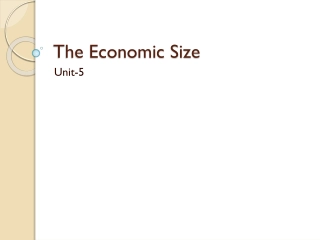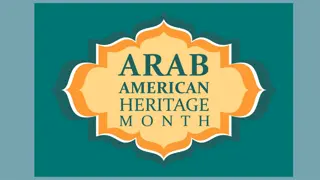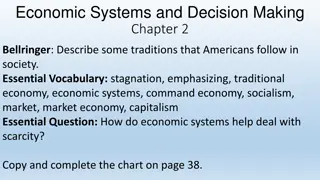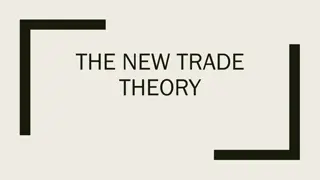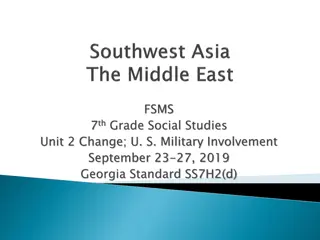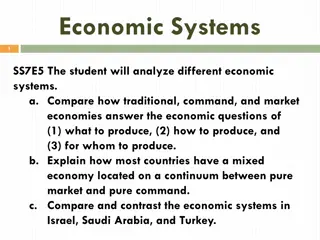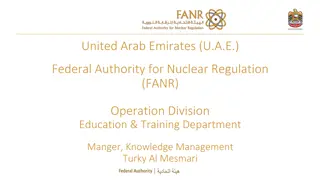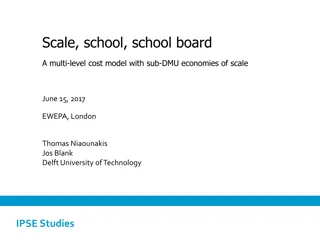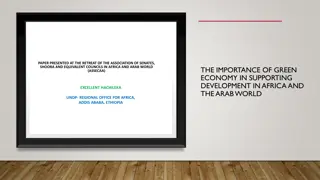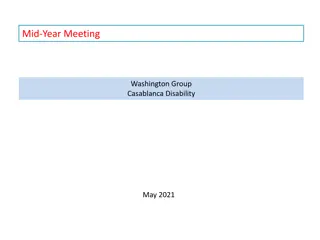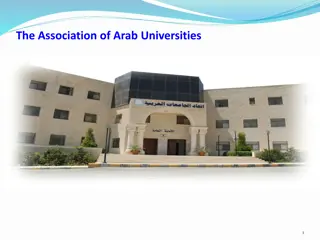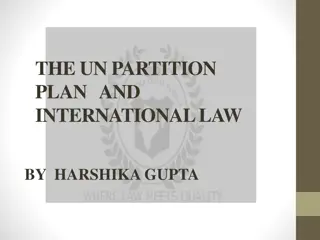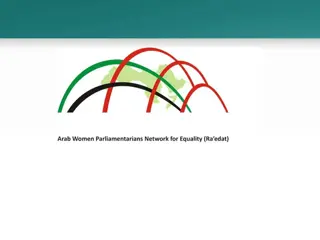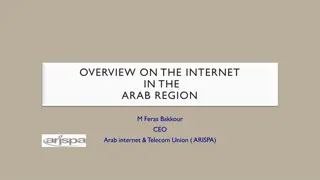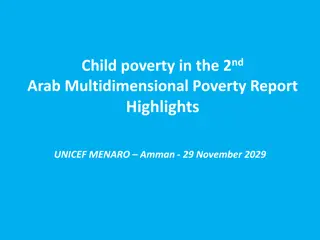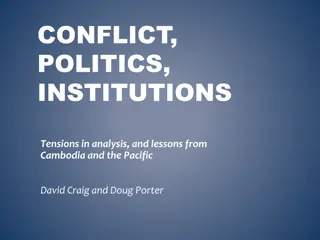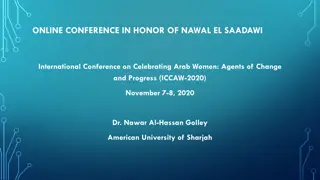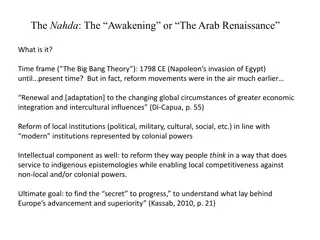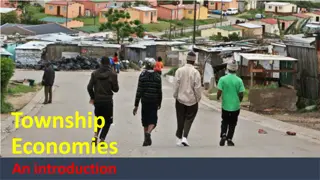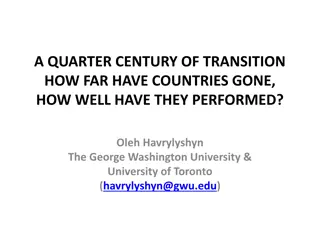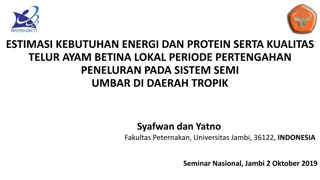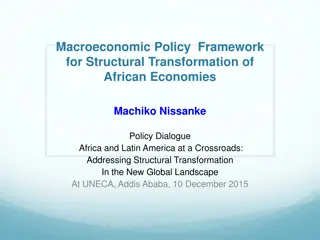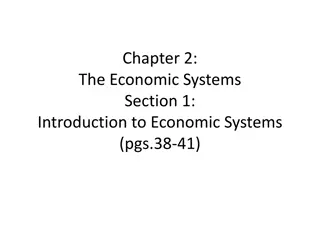The Economic Size
Economies of scale and how it can benefit businesses. Learn about the different types of economies of scale and their effects on production costs. Discover the sources that can help achieve economies of scale.
1 views • 21 slides
Celebrating Arab American Heritage: Culture, Diversity, and Contributions
Explore the rich heritage of Arab Americans, encompassing a diverse group with roots in 22 Arab countries across Northern Africa to Western Asia. Discover their language, culture, and significant contributions to American society. Learn about Arab American Heritage Month and educational resources to
0 views • 8 slides
Interdisciplinary Approach in Political Science and Its Relation with History
The need for an interdisciplinary approach in political science emerged in the 20th century to study political issues from various social science perspectives. This approach emphasizes the interrelation between political science and other disciplines like history. History provides the foundation for
0 views • 23 slides
Understanding Insiders and Outsiders in Arab Political Economies
Examining core Arab countries outside the Gulf, this analysis delves into the unique features of Arab capitalism, highlighting low state capacity, heavy regulation, and segmented labor markets. State intervention plays a crucial role in creating insiders and outsiders, shaping a landscape of low ski
1 views • 56 slides
Institutionalism and Methodological Issues in Political Science
Institutionalism is a foundational concept in political science, emphasizing the study of governing institutions and their role in shaping political behavior. It explores inductive and deductive approaches to research, highlighting the significance of empirical evidence and theoretical assumptions.
0 views • 19 slides
Understanding Gramsci's Political Theory and its Relevance Today
Gramsci's political theory, focusing on concepts such as hegemony, historical bloc, and the role of intellectuals, offers valuable insights into contemporary political challenges. Explored through the lenses of Prof. Ken Spours and Stuart Hall's analytical tradition, this analysis sheds light on Con
0 views • 13 slides
Understanding Economic Systems and Decision Making
The chapter delves into different economic systems such as traditional, command, and market economies, exploring how each handles scarcity and decision-making. It discusses traditions in American society, essential vocabulary, advantages, and disadvantages of traditional economies, and the impact of
0 views • 34 slides
Evolution of Citizenship in Liberal Democracy
Citizenship within liberal democracy entails equal rights, duties, liberties, and constraints for individuals within a political community. The entrenchment of civil and political rights has shaped the struggle for membership and participation in political communities. Civil rights, essential for in
1 views • 11 slides
The New Trade Theory and Economies of Scale in International Trade
The New Trade Theory, emerged in the 1970s, challenges traditional trade theories by emphasizing the role of increasing returns and economies of scale in international trade. It introduces the concept of industrial organization and imperfect competition to explain how countries trade not only based
0 views • 12 slides
Token Economies and Behaviour Modification in Custody: Evaluating Efficacy
This article explores the application of token economies in prisons as a behaviour modification technique based on operant conditioning. Token economies involve exchanging tokens for desired behaviours, aiming to replace undesirable actions with positive reinforcement. The use of increments, consist
0 views • 19 slides
U.S. Military Involvement in Southwest Asia: Analyzing Historical Continuity and Change
This unit covers the influence of the U.S. in Southwest Asia and explores events such as the Persian Gulf conflict, invasions of Afghanistan and Iraq. Students will examine the establishment of the modern State of Israel, including historical reasons like Jewish religious ties, the Holocaust, anti-S
5 views • 37 slides
Understanding Political Theory through a Contextual Approach
Exploring G.H. Sabine's perspective on political theory through a contextual approach, emphasizing the importance of historical context and societal influences. Sabine argues that while political theory evolves with its contemporary politics, it should be analyzed within its specific time and social
0 views • 9 slides
Understanding Economic Systems and Their Impacts
Explore traditional, command, and market economies, and how they address economic questions. Understand the concept of mixed economies and their placement on a continuum between market and command systems. Compare economic systems in Israel, Saudi Arabia, and Turkey. Delve into essential economic vo
0 views • 17 slides
Overview of United Arab Emirates Federal Authority for Nuclear Regulation (FANR) Operations Division Education & Training
The United Arab Emirates Federal Authority for Nuclear Regulation (FANR) Operation Division's Education & Training Department is led by Turky Al Mesmari. They focus on capacity building, nuclear safety, and strategic goals to ensure peaceful, safe, and secure use of nuclear energy. The department ai
3 views • 12 slides
Economies of Scale in Dutch Primary Education: A Multi-level Cost Model
This paper explores economies of scale in Dutch primary education, focusing on school boards and school compositions. The study examines the impact of school size variations on cost determination at both levels, considering the challenges of limited input data availability. Different solutions are p
3 views • 16 slides
Life in Auranitis, Jebel Arab Trachonitis, and Leja Batanaea
Auranitis, Jebel Arab Trachonitis, and Leja Batanaea were regions with main cities like Canatha, Adraa, and Bostra. The villages in these areas had no formal plans, with houses similar to those in Dead Cities, featuring storage downstairs, courtyards, flat roofs, and internal staircases. Villagers m
0 views • 12 slides
Understanding Political Beliefs and Behaviors: A Comprehensive Overview
Explore the formation, evolution, and transmission of political beliefs, as well as the impact of differing beliefs and behaviors on the political process. Delve into platform issues, political affiliations, and their influences to gain a deeper understanding of the political landscape.
1 views • 53 slides
Understanding Nationalism in Political Science
Nationalism, a complex concept, defines the nation as the fundamental unit of political rule. It encompasses a mix of objective and subjective factors, including cultural, ethnic, and political traits. The definition of a nation is subjective, based on how its members perceive themselves as a distin
0 views • 27 slides
Challenges and Opportunities: Green Economy Impact in Africa and Arab World
The paper presented at the ASSECAA retreat highlights the importance of the green economy in supporting development in Africa and the Arab world amidst the global economic crisis. It discusses challenges such as slow recovery from COVID-19, geopolitical instability, and climate change effects, empha
1 views • 30 slides
Enhancing Disability Statistics in the Arab Region: The Casa Group Initiative
The Casa Group for Disability Statistics in the Arab Countries was established to improve data collection on disability by encouraging the use of standardized tools and developing comparable indicators. Through various meetings and publications, the group aims to build capacity among statisticians,
0 views • 5 slides
The Association of Arab Universities: Promoting Higher Education Cooperation
The Association of Arab Universities (AARU) is a non-governmental organization established in 1964 with the mission to assist Arab universities in preparing capable graduates to serve their communities and preserve cultural heritage. With 260 member universities, AARU aims to enhance cooperation, pr
0 views • 52 slides
Perception of Security in Arab Countries: Analysis and Comparison
This research study delves into the perception of security in Arab countries, focusing on personal, community, and national dimensions. The study aims to understand the factors influencing security perceptions through indexes and surveys conducted in Spain and the Arab world. By comparing data from
2 views • 13 slides
The UN Partition Plan and International Law in Relation to Resolution 181 by Harshika Gupta
The United Nations Resolution 181, passed in 1947, recommended the partition of Palestine into Arab and Jewish states. This plan, which led to conflict and violence, was considered a legal basis for the establishment of Israel. The resolution addressed the competing claims of Jews and Arabs over Bri
1 views • 15 slides
Challenges and Opportunities for Arab Women in Sustainable Development
Arab women face numerous challenges in achieving full participation in sustainable development, as highlighted by the gender gap in various areas such as poverty, education, and access to resources. Empowering women and achieving gender equality are crucial for driving sustainable solutions to envir
0 views • 25 slides
Internet Overview in the Arab Region by ARISPA
The Arab Internet & Telecom Union (ARISPA) provides a detailed overview of internet penetration rates in the Arab region, focusing on global and regional comparisons, as well as the future IPv4 situation. Founded in 2006, ARISPA works under the Arab Economic Union Council, with 20 members representi
0 views • 17 slides
Understanding Political Science: A Comprehensive Overview
The study of political science delves into various aspects, from the pursuit of the good society to the exercise of power and the allocation of resources. It encompasses specialized fields such as American politics, international relations, comparative politics, public policy, and political philosop
0 views • 5 slides
Understanding Child Poverty in the Arab Region: Insights from the Arab Multidimensional Poverty Reports
The Arab Multidimensional Poverty Reports shed light on child poverty, emphasizing the importance of focusing on children's well-being alongside household-level measurements. The reports utilize the Arab-MODA framework to measure child poverty, assessing various dimensions such as health, education,
0 views • 19 slides
Political Development Theory and Practice: An Overview
Political development refers to the evolution of institutions forming the political power system of a society. Initially popular in the 60s-70s to describe political change, it later fell out of favor for being Euro-centric but has since regained significance. The concept encompasses aspects like po
0 views • 13 slides
Understanding Tensions in Political Analysis: Lessons from Cambodia and the Pacific
Explore the nuances of political and institutional analysis post-conflict, examining the intertwined dynamics of political settlements, economies, and institutional arrangements. Discover the complexities of structural antecedents, pacting, and instrumentalization, alongside insights from political
0 views • 19 slides
Understanding Political Party Funding Act of 2018
The Political Party Funding Act of 2018 regulates the funding of political parties in South Africa, ensuring equitable and proportional funding for parties participating in national and provincial legislatures. The Act defines various terms such as donations, foreign persons, and political parties,
0 views • 42 slides
Celebrating Nawal El Saadawi: International Conference Honoring Arab Women
Join the ICCAW-2020 conference on celebrating Arab women, honoring the fearless feminist Nawal El Saadawi. Explore her life, activism, and struggle against gender, class, and political oppressions. Engage with discussions on her impact as a role model for Arab and non-Arab women worldwide.
0 views • 25 slides
Emerging Trends in Arab Renaissance and the Evolution of Arabic Literature
The Nahda, or Arab Renaissance, initiated in the late 18th century, marked a period of reform and adaptation in Arab societies, aiming to align with modern institutions and promote intellectual advancement. This movement sought to embrace progress, foster rationality, and understand civilization's r
0 views • 5 slides
Explore the Fascinating World of Political Science
The Department of Political Science offers a range of courses, delving into topics such as political theory, international relations, and governance. Understand the distinction between politicians and political scientists, and explore branches of political science like public administration and huma
0 views • 16 slides
Understanding Township Economies and Apartheid Border Industry Policies
Township economies consist of diverse enterprises predominantly characterized by informality and survivalist nature, with a significant number not lasting beyond 3 years. These economies have birthed successful black entrepreneurs, transitioning from serving exclusively the township market. On the o
0 views • 17 slides
Economic Transition in Post-Communist Countries: A Quarter Century Review
This presentation by Oleh Havrylyshyn explores the progress and performance of post-communist economies since the fall of the Berlin Wall in 1989. It compares different countries' approaches to marketization, privatization, economic performance, and political transformation. The analysis highlights
1 views • 28 slides
Impact of Political Stability on Equity Trading Costs of Cross-Listed Firms
The research explores the relationship between political stability and equity trading costs of cross-listed firms, highlighting the impact of political institutions, liquidity, and investor protection. It delves into the importance of factors like quality of political institutions, transparency, and
0 views • 24 slides
Interdisciplinary Relationships in Political Science
Political science and history share a symbiotic relationship, with history providing the foundation for political analysis while political science influences historical events. The contribution of economics to political science is evident in how economic conditions shape political ideologies and pol
0 views • 12 slides
Estimasi Kebutuhan Energi dan Protein Ayam Arab Periode Pertengahan Peneluran
Ayam lokal memiliki potensi untuk menghasilkan daging dan telur. Perbaikan dalam produksi telur ayam dilakukan dengan intensif dalam pemeliharaan dan peningkatan energi serta protein. Pada periode peneluran pertengahan, dilakukan penghitungan kebutuhan protein dan energi serta evaluasi produksi dan
0 views • 18 slides
Macroeconomic Policy Framework for Structural Transformation of African Economies
Structural transformation is essential for the development of African economies, involving shifts towards higher productive activities and inclusive growth. The process requires purposeful efforts to create articulated economies with coordinated economic activities and positive externalities. Emphas
0 views • 13 slides
Understanding Different Economic Systems
Introduction to economic systems reveals how societies address scarcity by determining what to produce, how to produce, and for whom. Traditional, command, market, and mixed economies are explored, highlighting their distinct approaches. Traditional economies rely on customs, command economies are g
0 views • 9 slides
